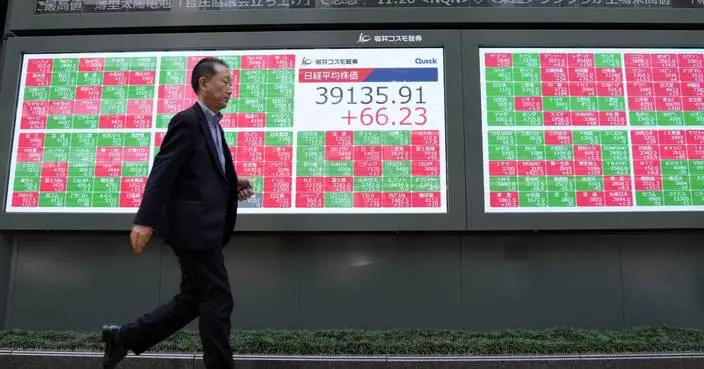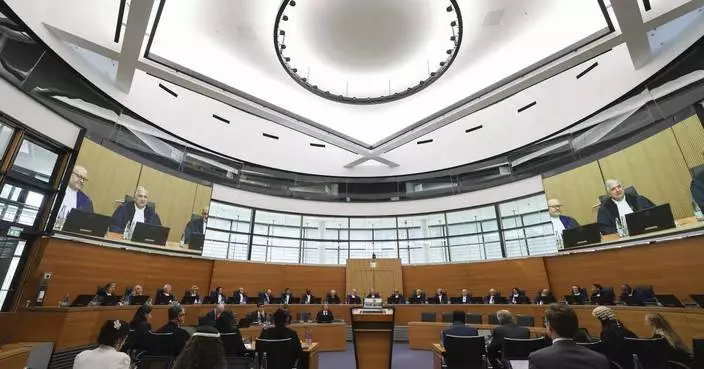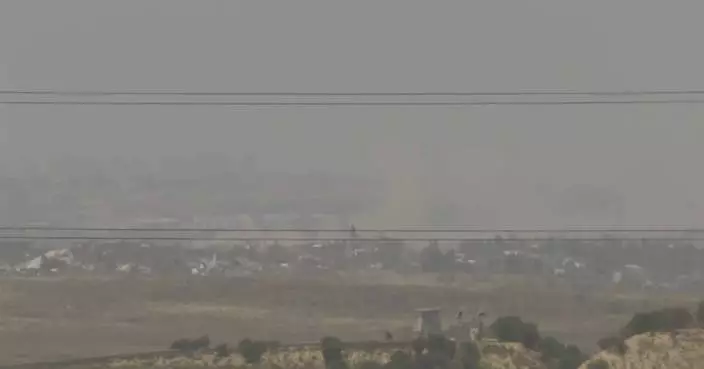BOSTON (AP) — Celtics center Kristaps Porzingis has been ruled out of Boston's potential series-clinching matchup against the Miami Heat with a strained right calf.
Porzingis played only 14 minutes in Boston's 102-88 Game 4 win at Miami, leaving in the second quarter and finishing with seven points and three rebounds.
Veteran Al Horford will likely replace Porzingis in the starting lineup for Wednesday's Game 5, with support off the bench from Luke Kornet.
The Celtics lead the Heat 3-1. The Boston-Miami winner will meet the Cleveland-Orlando winner in the Eastern Conference semifinals.
Asked after Game 4 how Porzingis' potential absence could affect his team, Boston coach Joe Mazzulla said nothing would change.
“Bringing the same mindset, intentionality, toughness, details to the next game regardless of who’s available,” Mazzulla said. “It doesn’t matter. There’s no difference between the regular season and the playoffs. And all year, we’ve had guys step in and play.”
AP NBA: https://apnews.com/NBA

Boston Celtics center Kristaps Porzingis (8) and forward Jayson Tatum (0) defend against Miami Heat center Bam Adebayo (13) during the first half of Game 4 of an NBA basketball first-round game, Monday, April 29, 2024, in Miami. (AP Photo/Marta Lavandier)
PRISTINA, Kosovo (AP) — The European Union on Tuesday reprimanded Kosovo over the unilateral closure of six branches of a Serbia-licensed bank, saying the move would negatively impact the life of the ethnic Serb minority living in northern Kosovo and damage Kosovo-Serbia normalization talks.
On Monday, Kosovo police closed the branches of the Postal Saving Bank in line with the decision to ban the use of the Serbian dinar currency in the country. They also confiscated 1.6 million euros ($1.74 million) and some 75 million dinars ($700,000), which the judiciary will later decide what to do with.
Starting on Feb. 1, the government required areas dominated by the ethnic Serb minority in Kosovo to adopt the euro currency, which is used in the rest of the country, and abolished the use of the Serbian dinar.
Pristina postponed the move for about three months, following pressure from the EU and the United States, concerned that the decision would negatively impact the ethnic Serb minority in northern Kosovo.
An EU statement from Brussels, which was emailed to The Associated Press, considered the move as “escalatory … against the spirit of normalization,” adding that such “uncoordinated actions" by Kosovo put chances of reconciliation “at risk.”
The State Department also was “disappointed” with Kosovo’s lack of coordination with international partners for the move, fearing it would escalate tensions.
“The United States reiterates its clear concerns about the implementation of the amended Central Bank of Kosovo regulation that restricts the import and use of the Serbian dinar in Kosovo,” said a statement.
The British embassy in Pristina also warned that the move would “risk escalating tensions and making a long-term solution to the currency issue in Kosovo more difficult.”
Kosovar Finance Minister Hekuran Murati said everything was done in accordance with the law.
“There is justified suspicion that such activity was conducted without the proper financial license, something which is illegal and should suffer legal consequences,” said Murati at a news conference.
Murati said Pristina has offered alternatives but they were not accepted by Belgrade “because they have had other intentions, not aiming at helping citizens' life.”
Brussels and Washington are pressing both countries to implement agreements that Serbian President Aleksandar Vučić and Kosovo Prime Minister Albin Kurti reached in February and March last year.
The EU-facilitated normalization talks have failed to make progress, especially following a shootout last September between masked Serb gunmen and Kosovo police that left four people dead and ratcheted up tensions.
Most of Kosovo uses the euro, even though the country isn’t part of the EU. Parts of Kosovo’s north, populated mostly by ethnic Serbs, continue to use the dinar. Many Serbs there rely on the government of Serbia for financial support, often delivered in dinars in cash.
“In the continued absence of sustainable alternatives, this will have negative effects on the daily lives and living conditions of Kosovo Serbs and other communities eligible for financial transfers from Serbia,” the EU statement said.
Serbia's and Kosovo's chances of joining the EU one day are jeopardized by their refusal to compromise, according to the bloc’s foreign policy chief, Josep Borrell.
The EU again urged Kosovo and Serbia to return to the negotiating table.
Serbian forces fought a 1998-99 war with ethnic Albanian separatists in what was then the province of Kosovo. About 13,000 people, mostly ethnic Albanians, died until a 78-day NATO bombing campaign pushed Serbian forces away. Kosovo declared independence in 2008, which Belgrade doesn’t recognize.

FILE - A man withdraws Serbian Dinars from a bank cash machine in northern Serb-dominated part of ethnically divided town of Mitrovica, Kosovo, on Jan. 31, 2024. The European Union on Tuesday, May 21, 2024, reprimanded Kosovo over the unilateral closure of six branches of a Serbia-licensed bank, saying the move would negatively impact the life of the ethnic Serb minority living in northern Kosovo and damage Kosovo-Serbia normalization talks. (AP Photo/Bojan Slavkovic)











